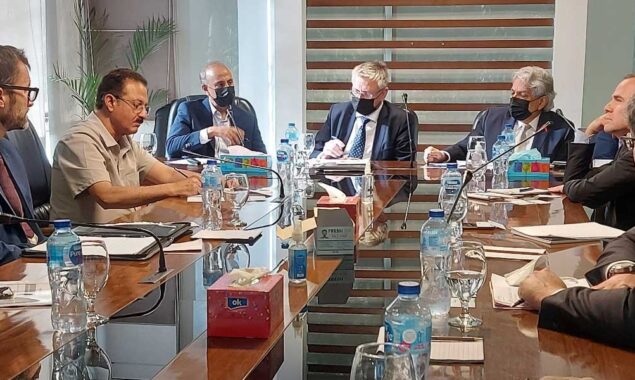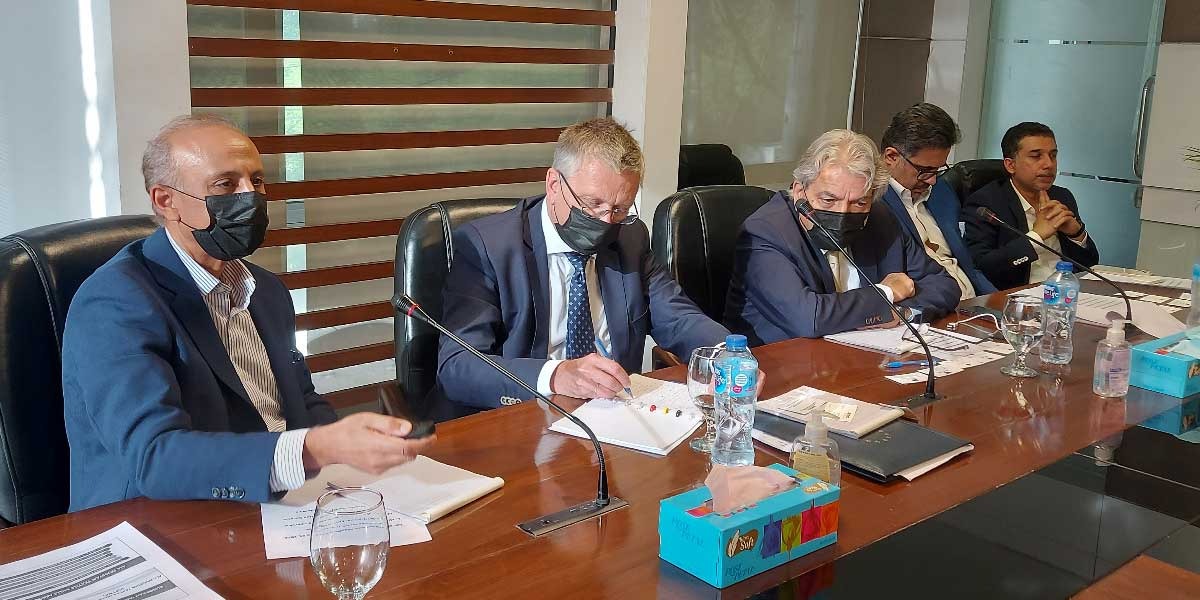
LAHORE: The European Union’s Generalised System of Preferences plus (GSP Plus) monitoring mission has discussed in detail the developments and progress made on the implementation of 27 international conventions concerning GSP+ with the All Pakistan Textile Mills Association (APTMA) leadership.
The mission, including Guido Dolara, director general, Trade Service; Guus Houttuin, External Action Service; Andreas Striegnitz, External Action Service; and Srefan Schroeer, Employment Service; visited the APTMA House on Friday where it was received by APTMA Chairman Abdul Rahim Nasir, APTMA North Zone Chairman Hamid Zaman, Senior Vice Chairman Kamran Arshad, Aamir Fayyaz, former APTMA chairman, senior textile leaders and APTMA Secretary General Raza Baqir.
Houttuin said that the European Commission has published the legislation for the GSP scheme (2024/34) on September 22, 2021 for the new GSP Scheme.
The EU had added six new conventions along with assessing the situation of human rights, press freedom, gender equality and child labour-related issues last year, while extending the GSP Plus status for Pakistan.
Members of the visiting delegation informed APTMA members that the newly-proposed scheme aims at improving the key features of the scheme to better respond to the evolving needs and challenges of the GSP countries, as well as, reinforce the scheme’s social, labour, environmental and climate dimensions. It will be in place for 10 years.
There is an expansion in the list of international conventions from 27 to 32 that beneficiary countries will have to ratify and implement, he added.
Rahim Nasir said that since the grant of GSP Plus status to Pakistan, the country’s textile and clothing exports to the European Union have increased 63 per cent, while the overall exports have increased 45 per cent.
The government had already approved the Textiles and Apparel Policy (TAP) 2020/25 to double Pakistan’s export target up to $42 billion, he said, adding that the Textile Policy approved by the Cabinet contemplated a three-year target, as textile exports will be jacked up to $27 billion in the fiscal year 2022/23, $34 billion in 2023/24 and $42 billion in the fiscal year 2024/25, he noted.
The textile sector alone represents 46 per cent of the total manufacturing sector and around 40 per cent of the total labour force, he said, adding that the textile exports of $15.4 billion registered in FY21 are expected to fetch $20 billion by the close of the current financial year.
The performance of textile exports during May this year was highly recommendable, recording an upsurge of 50 per cent over the last year and it was encouraging to note that the value-added sector in textiles has shown unprecedented growth, he added.
The APTMA North chairman Zaman highlighting the effects of GSP plus on Pakistan and said the GSP Plus has boosted Pakistan’s competitiveness and provides an edge to the Pakistani exports over regional competitors, besides an increase in employment, investment and upgradation of technology, enhanced foreign investment and opened window for Pakistani exports, especially when China is losing the market due to higher cost of production and other factors.
According to him, the facility has also uplifted Pakistan economically, socially and environmentally, as the compliance to the 27 conventions relating to human rights, environment, labour rights, narcotics control and corruption control has improved the working conditions and the image of Pakistan. Meanwhile, he added, compliance with the six new conventions was in progress.
Zaman added that any withdrawal of GSP Plus is fraught with risks of plummeting Pakistani exports by removing edge and competitiveness for exports and lead to not less than Rs1 trillion/annum loss to the industry.

Any withdrawal of GSP Plus would create massive unemployment, large-scale closure of mills and an increase in poverty with a domino effect on the banking sector, as more than 40 per cent of the bank loans are obtained by the textile sector. The real estate, goods transport and allied industries will suffer adversely, causing massive unrest, he added.
In his vote of thanks, APTMA Senior Vice Chairman Kamran Arshad informed the visiting EU delegation that Pakistani exporters are heading towards diversification of exports, which requires major overhauling and upgradation of industry, BMR, research, training and HR, especially for the SME sector and continuation of the regionally competitive energy tariff.
He expressed the hope that the European Union would extend the GSP Plus status for another 10 years to provide support to the textile and other industrial sectors of Pakistan.
He thanked the delegation for sparing time to visit Pakistan.
Read More News On
Catch all the Business News, Breaking News Event and Latest News Updates on The BOL News
Download The BOL News App to get the Daily News Update & Follow us on Google News.




